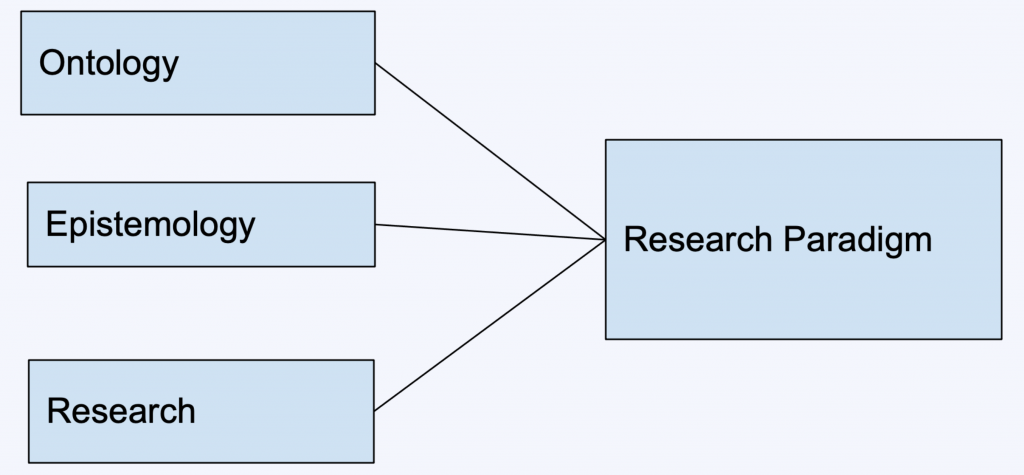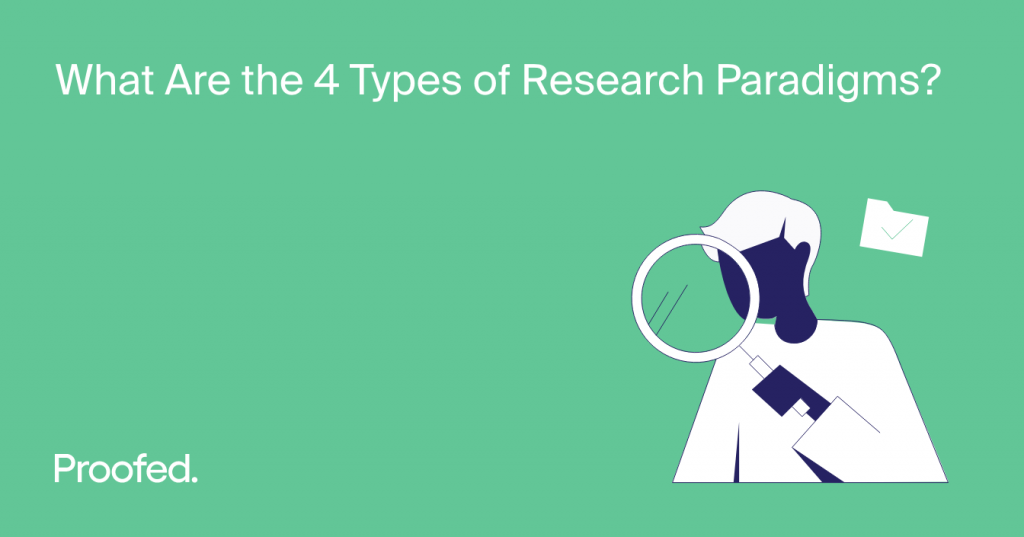
- 4-minute read
- 1st March 2022
Research Paradigms: Explanation and Examples
Are you planning a research project? If so, you’ll need a research paradigm. But what exactly is a research paradigm, and why is it important? This blog post will cover the following:
● The definition of a research paradigm
● Why research paradigms are important
● Common examples of research paradigms
● Merging research paradigms
● Expert editing and proofreading
Read on to find out more or learn about research paradigms in the video below!
The Definition of a Research Paradigm
A research paradigm is a philosophical framework that your research is based on. It offers a pattern of beliefs and understandings from which the theories and practices of your research project operate.
A research paradigm consists of ontology, epistemology, and research methodology.

● Ontology answers the question: “What is reality?” That is, does a single reality exist within your research? An example of an ontological question would be: “Does God exist?” There are two possible realities (or ontologies) in response to this question: “Yes, God exists,” or “No, God does not exist.”
● Epistemology is the study of knowledge. It answers the question: “How is it possible to know reality?” Epistemology incorporates the validity, parameters, and methods of acquiring knowledge. An example of an epistemological question would be: “How is it possible to know whether God exists or not?”
● Research Methodology answers the question: “How do we go about discovering the answer or reality?” This includes the process of data collection and analysis. Research methodology should outline how you conduct your research and demonstrate that the findings are valid.
Find this useful?
Subscribe to our newsletter and get writing tips from our editors straight to your inbox.
Subscribe to Beyond the Margins and get your monthly fix of editorial strategy, workflow tips, and real-world examples from content leaders.
Together, ontology and epistemology comprise research philosophy.
Research philosophy combined with research methodology comprises a research paradigm.

Why Are Research Paradigms Important?
Research paradigms are important because they form the philosophical basis of a research project. Research paradigms influence how different schools of learning (such as the sciences versus the humanities) undertake their research. Once a research philosophy has been determined, an appropriate methodology can be chosen.
Furthermore, a knowledge of the philosophical foundation of your research will increase its quality and improve your performance in any analysis you may have to undergo!
Common Examples of Research Paradigms
1. Positivism
Positivists believe that there’s a single reality that’s possible to measure and understand. Because of this, they’re most likely to use quantitative methods in their research. Typically, positivists propose a hypothesis that can be proved or disproved using statistical data analysis. Positivism tends to investigate the existence of a relationship between two variables rather than the reason behind it.
2. Constructivism
Constructivists believe that there’s no single reality or truth, but rather multiple realities. They devote themselves to understanding and interpreting the meaning attached to an action. For this reason, constructivists tend to use qualitative research methods, such as interviews or case studies, which focus on providing different perspectives. Constructivism aims to provide the answer to “why.” For example, asking “Why do 25% of the employees of an organization regularly arrive late to work?” rather than merely establishing the relationship between two variables (e.g., time of arrival at work and availability of nearby parking).
3. Pragmatists
Pragmatists believe that reality is continually interpreted and renegotiated against the backdrop of new and unpredictable situations. Because of this, the philosophy they apply in research depends on the research question itself. Pragmatists often combine positivist and constructivist principles in the same research project, using both qualitative and quantitative methods to investigate different components of a research problem. They believe that the optimal research methods are those that most successfully answer the research question.
Merging Research Paradigms
While most social science research operates from either a positivist (experimental) or constructivist paradigm, it’s possible to combine both, as the field of psychology often does. Quantitative and qualitative methodology are frequently used together in psychology, illustrating the subject’s footing in multiple research paradigms (positivist and constructivist).

Expert Editing and Proofreading
If you’re writing a research proposal or paper, you’ll want to ensure that your writing is error-free, fluent, and precise. Although re-reading your own work is valuable, it can be very helpful to get another opinion on your writing. We offer a free trial of proofreading and editing services when you submit your first document. Click here to find out more!
Next Up





